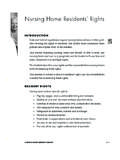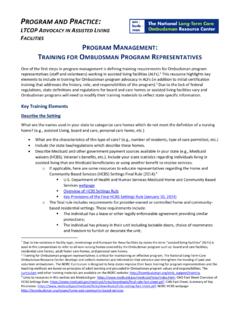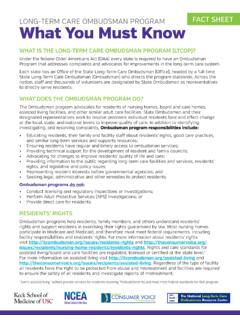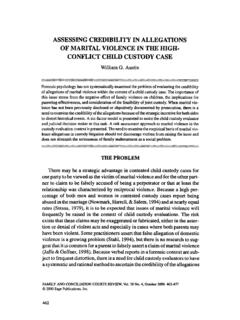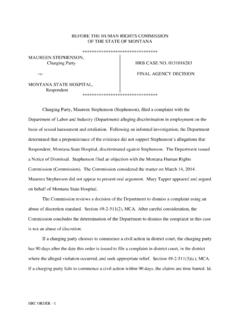Transcription of RESPONDING TO LLEGATIONS OF BUSE ROLE AND …
1 1 RESPONDING TO allegations OF abuse : ROLE AND RESPONSIBILITIES OF LONG-TERM CARE OMBUDSMEN OVERVIEW Provisions in the Older Americans Act (OAA) state that Long-Term Care Ombudsmen (LTCO) shall identify, investigate and resolve complaints regarding action, inaction, or decisions that may adversely affect the health, safety, welfare or rights of the residents made by, or on behalf of, Complaints may include, but are not limited to, allegations of abuse , gross neglect and exploitation. Long-Term Care Ombudsmen are resident-centered advocates, directed by resident goals for complaint resolution and federal disclosure requirements; therefore, the LTCO role in investigating allegations of abuse is unique and differs from other entities such as, adult protective services and state licensing and certification agencies.
2 These disclosure requirements mean that information shared with or gathered by the LTCO is confidential unless consent is obtained as described below in the OAA provisions. Furthermore, LTCO programs receive complaints from a variety of individuals ( residents, family members, facility staff, representatives of other agencies), but due to strict requirements in the OAA, LTCO may not disclose the identity of the resident or complainant without receiving permission from the resident or complainant (or their legal representative). The purpose of this guide is to discuss how Ombudsmen can respond to allegations and observations of abuse , neglect and exploitation when the resident does not or cannot give consent to pursue the complaint.
3 In the absence of resident consent, ombudsmen can take other actions to adhere to disclosure requirements and work to ensure the resident receives quality care and is protected from harm. This guide reviews the federal requirements regarding complaint investigations and disclosure, highlights statements from the Administration on Aging, and provides advocacy strategies and additional Note: A few State Long-Term Care Ombudsman Programs (LTCOPs) receive allegations of abuse and investigate to substantiate the complaint (gather evidence to prove abuse occurred), but the primary focus of this resource is to discuss the role of the LTCOP in response to complaints according to the Older Americans Act and Administration on Aging technical assistance to states, not compare individual state LTCOP responsibilities.
4 KEY POINTS What is abuse ? Since states have different definitions for abuse , neglect and exploitation, this guide will use the definitions provided in the National Ombudsman Reporting system (NORS) definitions of complaint codes and unless otherwise stated, we use the term abuse to include any willful act of abuse , gross neglect and exploitation throughout this Older Americans Act Provisions Under federal law, "the files and records" of the long-term care ombudsman program "may be disclosed only at the discretion of the [State] Ombudsman (or the person designated by the Ombudsman to disclose files and records).
5 "4 1 Older Americans Act of 1965. Section 712 (a)(3)(A) 2 Examples for statewide LTCOPs are available in a supplemental resource titled, RESPONDING to allegations of abuse : Role and Responsibilities for Long-Term Care Ombudsmen- State Long-Term Care Ombudsman Program Policies, Procedures and Practices. 3 Administration on Aging. Administration for Community Living. Long-Term Care Ombudsman Program Complaint Codes. OMB. NO. 0985-0005. Expiration Date: 07/31/2015. TA GUIDE: TECHNICAL ASSISTANCE FOR LTCO PRACTICE 2 Furthermore, the "identity of any complainant or resident with respect to whom the [Ombudsman] Office maintains such files or records" cannot be disclosed without either consent from the complainant or resident, or from their legal representative, or pursuant to a court The State Ombudsman cannot authorize disclosure of the identities of complainants or residents without their consent, or the consent of their legal representatives, or pursuant to court order.
6 The Older Americans Act provisions regarding long-term care ombudsman disclosure are as follows: (d) DISCLOSURE. (1) IN GENERAL. The State agency shall establish procedures for the disclosure by the Ombudsman or local Ombudsman entities of files maintained by the program, including records described in subsection (b)(1) or (c). (2) IDENTITY OF COMPLAINANT OR RESIDENT. The procedures described in paragraph (1) shall (A) provide that, subject to subparagraph (B), the files and records described in paragraph (1) may be disclosed only at the discretion of the Ombudsman (or the person designated by the Ombudsman to disclose the files and records); and (B) prohibit the disclosure of the identity of any complainant or resident with respect to whom the Office maintains such files or records unless (i) the complainant or resident, or the legal representative of the complainant or resident, consents to the disclosure and the consent is given in writing.
7 (ii) (I) the complainant or resident gives consent orally; and (II) the consent is documented contemporaneously in a writing made by a representative of the Office in accordance with such requirements as the State agency shall establish; or (iii) the disclosure is required by court order. Administration on Aging Statements In addition to the program requirements regarding disclosure and complaint investigation outlined in the Older Americans Act, the Administration on Aging has responded to questions regarding the role of the Office of the State LTCO in investigating allegations of abuse . LTCO Role in Investigating allegations of abuse , Gross Neglect and Exploitation The primary responsibility of the LTCOP is to investigate and resolve complaints on behalf of residents, but the LTCO program is unique in that its goal is to resolve the complaint to the satisfaction of the resident or complainant as opposed to seeking to substantiate a complaint by gathering evidence to prove the allegation This difference means that the LTCO program does not have the same standard of evidence required for complaint investigation and resolution as other entities.
8 Such as Adult Protective Services, state survey agency and law enforcement. The investigation by other entities seeks evidence to demonstrate that laws or regulations were broken. Since the LTCOP s primary goal is to resolve complaints to the satisfaction of the resident, the LTCO seeks resolution on behalf of a resident regardless of whether violation of any law or regulation is at issue. 7 State Laws Regarding Mandatory Reporting of abuse Most states have mandatory reporting laws that require certain individuals ( facility staff, social workers) to report suspected elder abuse . However, state law may not require reporting of suspected abuse , neglect or exploitation by the LTCO Program where such reporting violates the Federal requirement that an ombudsman is prohibited from the disclosure of the identity of a complainant or resident without appropriate consent pursuant to Section 712(d) of the 4 42 3058g(d)(2)(A) 5 42 3058g(d)(2)(B)
9 6 Administration on Aging. Administration for Community Living. Instructions for Completing State Long Term Care Ombudsman Program Reporting Form for the National Ombudsman Reporting System (NORS). OMB 0985-0005. Expiration Date 07/31/2015. p. 5 7 Administration on Aging. Letter to Director Nels Holmgren, Utah Division of Aging and Adult Services. October 31, 2011. 3 OAA. 8 Even if a LTCO carries a professional license and is considered a mandatory reporter under their professional license ( a licensed social worker), the LTCO must adhere to the federal disclosure requirements when acting as a LTCO and cannot be required to report abuse without appropriate consent.
10 The LTCOP is unique in that it was designed to ensure that ombudsmen serve as the agent of residents and help residents to achieve what residents believe is in their best interest. 9 Additionally, facilities are required to protect residents from all forms of abuse and investigate reports of abuse . Due to the lack of federal regulations for assisted living ( board and care, personal care homes) state laws vary by state, but information regarding the federal regulations for nursing homes is available in the Resources section. WHAT CAN A LTC OMBUDSMAN DO IN THIS SITUATION? Respecting resident confidentiality is critical not only to maintain compliance with program requirements, but also to adhere to the fundamental LTCO role as resident advocates, maintain the integrity of the LTCOP and foster trust between the LTCO and residents.
